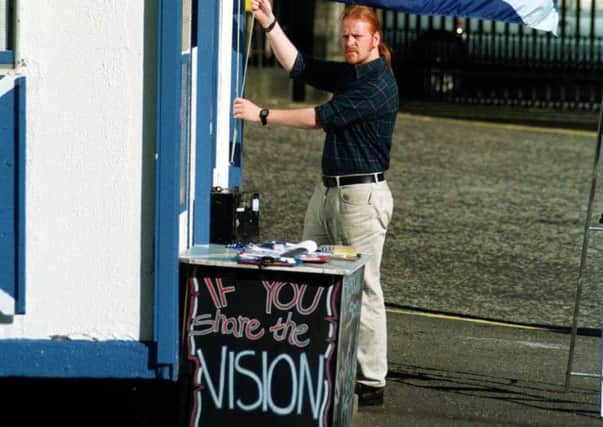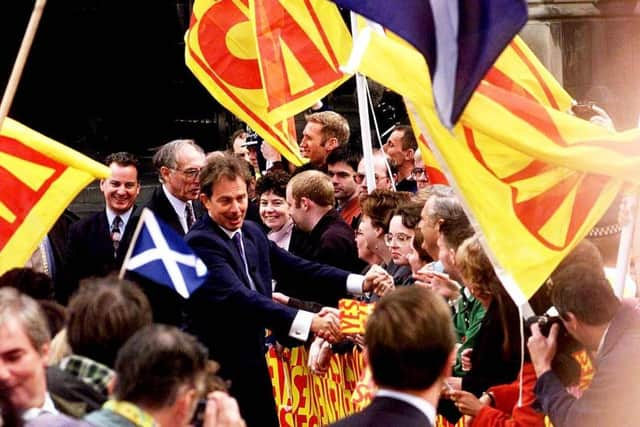The day a parliament returned to Scotland


Holyrood now firmly established at the centre of nation’s political life
As we mark the anniversary it is worth reflecting on the fact that people voted for a parliament with a whole range of devolved powers – with only those issues explicitly reserved to Westminster not falling to Holyrood.
Advertisement
Hide AdAdvertisement
Hide Ad

That is important because we now face the biggest threat to the powers of the Scottish Parliament since it was voted for. The UK government’s Brexit proposals include a naked power grab which would see aspects of already devolved issues returned to Westminster instead of Edinburgh.
That is a move which will be firmly resisted as it fundamentally undermines the founding principles of the parliament which were so strongly endorsed in a democratic vote in 1997. Holyrood is now firmly established at the centre of the nation’s political life – and, despite the early teething troubles over issues such as the cost of the building itself, successive surveys of public opinion show that the Scottish Parliament is held in higher esteem than Westminster.
Twenty years on, it is time to reaffirm our belief in the Scottish Parliament as a force for good and for improving the lives of everyone who calls this country home.
It is also a time to look to the future to imagine how, in another 20 years or more, Holyrood can even better serve its many citizens.


Nicola Sturgeon is First Minister of Scotland and was one of the first MSPs
Government came closer to the people
Jim Wallace
Within hours on Sunday 7 September 1997, I packed in a campaign rally with Messrs Dewar, Salmond and Connery in Edinburgh and a fiery televised debate in Glasgow. The following three days were just as frantic as we sought to regain momentum for the “Yes, Yes” campaign, following the suspension of activities after Princess Diana’s tragic death. I was in the BBC studio in Glasgow when the results came in. It was obvious that the Scottish Parliament, for which my party had campaigned for a century, and to which I was so personally committed, was going to become a reality. Debates about which powers could now give way to debates about how to use the powers.
Until we returned, in more recent times, to arguments over our constitutional status, parliament did focus attention on issues which affect people in their daily lives. We established a right to free nursery education; we reformed family law; re-introduced free eye and dental checks; abolished tuition fees, established national parks. Banning smoking in public places is arguably one of the most significant public health policies implemented in generations.
There have been mistakes – the creation of a single police force being one. But they are mistakes for which our elected MSPs are accountable. Westminster cannot be blamed, and that surely should be healthy.
Advertisement
Hide AdAdvertisement
Hide AdAbout to address a class of first-year law students in 2013, the head of the law school took me aside and said: “Remember, most of your audience can’t recall a Scotland without a Scottish Parliament.”
That a new generation of Scots takes the Parliament’s existence for granted is welcome affirmation that, although not perfect, we achieved the permanent legacy of bringing government closer to the people of Scotland.
Lord Wallace of Tankerness was the Lib Dem deputy first minister from 1999 to 2005
Vote represented release from ‘soul-destroying’ Westminster straitjacket
Dennis Canavan
It was the day that Scotland decided to escape from a political straitjacket. For me, it was also a liberating experience. I had been in the Westminster Parliament for nearly a quarter of a century. It was absolutely soul-destroying. When I was first elected to Parliament in 1974, I was brimming with idealism and enthusiasm. I thought then that a Scottish Parliament was just around the corner but the rigged referendum of 1979 soon scuppered that idea.
Then along came Margaret Thatcher who treated Scotland with utter contempt. Policies were forced upon us despite the fact that many of those policies had been clearly rejected by the people of Scotland. The poll tax was probably the worst example but there were many others.
The absence of a Scottish Parliament was described by some academics as a democratic deficit but, for many working class people, that translated into mass unemployment, widespread poverty and a feeling of abject hopelessness.
The 1997 Referendum heralded a big step-change, a basis for hope. We knew that the Scottish Parliament would not be a panacea for all of Scotland’s ills. But 11 September 1997 was the dawn of a new era. The next chapter will begin when the people of Scotland choose independence at the next referendum.
Advertisement
Hide AdAdvertisement
Hide AdDennis Canavan, a former Labour MP and independent MSP, chaired YesScotland from 2012 to 2014
The unlikely hero who eased the way
David Whitton
Cometh the hour cometh the man, so the saying goes. There is no doubt that Scotland was very lucky that, when it came to delivering Labour’s 1997 election promise of devolution, Donald Dewar was that man.
An unlikely hero maybe, but I personally doubt that any other of a talented group of Scottish politicians in Tony Blair’s Labour Cabinet could have achieved what Donald did. A lifelong believer in home rule for Scotland, when to be so was to court unpopularity among the party faithful north and south of the border, allied to a ferocious work ethic and shrewd intellect, Donald Dewar was the ideal choice to pilot such a historic piece of legislation through the House of Commons.
When I was offered the chance to join his group of special advisers he told me I would be able to be on the inside to see history being made. I doubt if the people of Scotland will ever understand just how much sheer hard graft went into making sure devolution was delivered.
Donald had said that every area of policy that could be devolved should be devolved to the new Scottish Parliament. In practical terms what that meant was many long hours preparing papers for Cabinet committees and more long hours arguing the case for devolved government with some who were not as convinced as Donald about the transfer of powers.
In his quest he was ably supported by his other special advisers, Murray Elder and Wendy Alexander and by an army of Scottish civil servants who received their directions through Ken Thomson, at the time the principal private secretary.
Some in the media dubbed Donald the “Father of the Nation,” not a title he would have ever have claimed for himself. Yet, there is no doubt history will record that Donald Dewar was the deliverer of devolution and that cannot be denied.
David Whitton, is a former Labour MSP who worked as an adviser to Donald Dewar
Labour fears sparked change
Brian Monteith
Advertisement
Hide AdAdvertisement
Hide AdTo stop Tory laws crossing the border and ensure Labour did not haemorrhage votes to the nationalists Labour had to prove itself more “Scottish” than its rivals – what better way to do this than deliver a legislative parliament in Edinburgh?
While Labour was supremely dominant in Scotland this lopsided constitutional meddling looked smart, but inevitably ruling parties lose. Instead of killing the SNP stone dead the by now taxpayer-funded SNP politicians worked away at undermining Labour and took power after only eight years. Within another seven we had a referendum that came close to breaking up the UK. The Scottish Parliament was intended to benefit Labour and therefore designed to spend money and unravel almost two decades of Tory reforms in housing, schools and the economy. Scotland has now lost its pre-eminence in education, there is a huge housing shortage and its economy consistently lags behind the UK. The Parliament’s political identity is defined by giving stuff away for free – on the back of the English taxpayer. Labour could have won its 1997 landslide without promising a Scottish Parliament; it did not halt the rise of nationalism. If Donald Dewar could have foreseen the 2015 election result even he would have had to Think Twice about delivering devolution.
Brian Monteith was founder and campaign manager of Think Twice – the No, No campaign in the 1997 referendum
A constitutional journey that will continue into the future
Henry McLeish
Scotland’s date with destiny on 11 September 1997, delivered a decisive endorsement of a new Parliament for Scotland and opened a new and dramatic era in Scottish politics.
This was the late Donald Dewar’s finest political hour. He delivered the, “settled will of the Scottish people”, and the, “unfinished business” of the late John Smith. Our democracy has been strengthened and in a short space of time this new institution has become a modern and innovative legislature.
The future is uncertain. Despite the madness of Brexit and a Britain that seems incapable of embracing a new and different future, there are grounds for optimism. Scotland has choices to make. In his memorable and far-seeing speech at the opening of the Scottish Parliament on 1 July 1999, Donald said: “For any Scot, today is a proud moment; a new stage on a journey begun long ago and which has no end. A Scottish Parliament. Not an end; a means to greater ends”.
Will the “greater ends” mean, more devo-unionism, or independence, or interdependence in Europe, or federalism?
Who knows. One thing is clear, the constitutional journey will continue.
Advertisement
Hide AdAdvertisement
Hide AdScotland is now a different place. More confident and self- assured and unwilling to even try to put the constitutional genie back in the bottle.
Henry McLeish succeeded Donald Dewar as First Minister